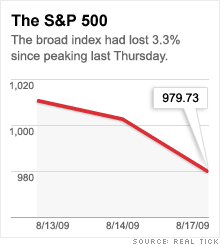Stocks tumble on consumer fears
Wall Street retreats as worries about the economy cause investors to bail out, after lifting stocks by 50% in five months.


NEW YORK (CNNMoney.com) -- Wall Street slumped Monday, falling for the second straight session, as worries that nervous consumers will pressure a fragile recovery dragged stocks lower after a five-month advance.
The Dow Jones industrial average (INDU) lost 186 points, or 2%, after having lost as much as 204 points earlier. The S&P 500 (SPX) index fell 24 points, or 2.4%.
Both the Dow and S&P 500 closed at 3-week lows.
The Nasdaq composite (COMP) lost 55 points, or 2.8%, ending at a one-month low.
A roughly five-month rally hit a roadblock last week after a worse-than-expected consumer sentiment report Friday. Signs that the economy is stabilizing -- combined with extraordinary amounts of fiscal and monetary stimulus -- have more or less lifted stocks since March, with the S&P 500 gaining 50%.
In the last month alone, the S&P 500 gained 15%. After such a run, a pullback was predictable, but it's unlikely to signal a bigger retreat, said Stephen Goldman, market strategist at Weeden & Co.
"You have a market that's seen most sectors and stocks rise in tandem and and so we should see a pretty orderly pullback," Goldman said. "We're still only down 2% or 3% from the highs."
As of last Thursday, the Dow was at a nine-month high and the Nasdaq and S&P 500 were at 10-month highs.
Goldman said he sees a continued advance through the fall. But he said the difference is that from now on, it's going to be a lot more choppy, with investors having already anticipated a lot of the economic improvement.
The CBOE Volatility (VIX) index, also known as the Vix, Wall Street's so-called fear gauge, spiked 15%, signaling a bigger stock pullback could be brewing.
"People are worried we've run too far, too fast and that we still have a long way to go in terms of the economy," said Dave Rovelli, managing director of U.S. equity trading at Canaccord Adams. "There are concerns about a double-dip recession."
Consumer issues: Meanwhile, concerns about consumers could limit the pace of the economic recovery.
While the housing and manufacturing sectors have started to stabilize, a weak labor market and higher oil and gas prices have kept consumers on the sidelines. With consumer spending fueling roughly two-thirds of economic growth, participation is necessary for a bigger economic recovery to take hold.
Underscoring the weakness in consumer spending, home improvement retailer Lowe's (LOW, Fortune 500) on Monday reported a worse-than-expected drop in second-quarter profit. Lowe's also issued a second-half outlook that is short of analysts' estimates. Shares plunged 10.3% and dragged on other retailers.
Home Depot (HD, Fortune 500) and other retailers are due to report results later in the week.
Stock declines Monday were broad-based, with 28 of 30 Dow stocks sliding, led by IBM (IBM, Fortune 500), Boeing (BA, Fortune 500), Chevron (CVX, Fortune 500), Exxon Mobil (XOM, Fortune 500) and 3M (MMM, Fortune 500).
Overseas markets slip: U.S. investors also reacted to a plunge in global stock markets.
In Asia, Japan's Nikkei index plunged 3.1% after a report showed the economy emerged from recession in the second quarter, but analysts said that the outlook was choppy. China's main index slumped almost 6% on worries about a stock market bubble.
In Europe, major markets all fell around 2%.
Manufacturing: The hard-hit sector continues to show signs of improvement. On Monday, the Empire State Manufacturing survey, a measure of activity in the New York area, rose to 12.1 in August versus a reading of negative 0.6 in July, according to the Federal Reserve Bank of New York. Any reading that is positive shows expansion in the sector.
The week brings a slew of economic news. On Tuesday, the government reports on July housing starts and building permits, and July producer prices, a measure of wholesale inflation.
Later in the week, reports are due on leading economic indicators, jobless claims, state-by-state unemployment and existing home sales.
Bonds: Treasury prices rallied, lowering the yield on the benchmark 10-year note to 3.47% from 3.56% Friday. Treasury prices and yields move in opposite directions.
Other markets: U.S. light crude oil for September delivery fell 76 cents to settle at $66.75 a barrel on the New York Mercantile Exchange.
COMEX gold for December delivery fell $12.90 to settle at $935.80 an ounce.
In currency trading, the dollar gained versus the euro and fell against the Japanese yen.
Market breadth was negative. On the New York Stock Exchange, losers beat winners by eight to one on volume of 1.22 billion shares. On the Nasdaq, decliners topped advancers by nearly five to one on volume of 1.94 billion shares. ![]()

